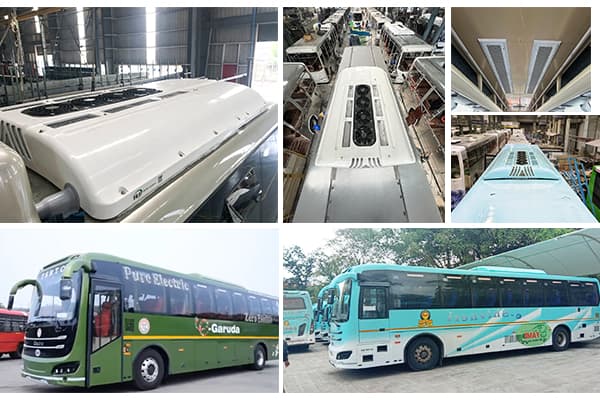In the realm of passenger comfort and transportation efficiency, bus air conditioning systems play a pivotal role. These systems, encompassing heating, ventilation, and air conditioning (HVAC), ensure a pleasant journey for passengers regardless of the external weather conditions. In this guide, we delve deep into the intricacies of bus HVAC systems, exploring their functionality, significance across various bus types, and the different types available in the market.

Understanding Bus HVAC Systems
A bus air conditioning system is a sophisticated assembly comprising several key components, each contributing to the overall cooling, dehumidification, and air quality maintenance within the passenger compartment. Let’s dissect the anatomy of a typical bus HVAC system:
Components:
1. Compressor: The heart of the system, the compressor is responsible for pressurizing the refrigerant, and initiating the cooling process.
2. Condenser: This component facilitates the transfer of heat from the refrigerant to the outside air, allowing the refrigerant to condense from a vapor to a liquid state.
3. Evaporator: Positioned within the passenger compartment, the evaporator absorbs heat from the interior air, cooling it down while also removing moisture.
4. Controls: These encompass the various sensors, switches, and electronic components that regulate the operation of the HVAC system, ensuring optimal performance and efficiency.

Importance of Bus Air Conditioning Systems
Coach Buses:
Modern coach buses are synonymous with comfort and luxury, offering passengers a serene environment conducive to relaxation during long-distance journeys. A robust air conditioning system is indispensable in achieving this, as it ensures a comfortable climate inside the coach, promoting passenger well-being and satisfaction.
School Buses:
Safety is paramount, especially when it comes to transporting students. Air-conditioned school buses mitigate the risk of heat-related incidents, safeguarding the health and well-being of students, particularly during sweltering summers.
Tourist and Double-Decker Buses:
A seamless and comfortable travel experience is imperative for tourists embarking on bus tours. Air conditioning not only enhances comfort but also contributes to the overall enjoyment of the journey, making it a vital amenity for tourist and double-decker buses.
City and Shuttle Buses:
In urban settings, where public transportation is heavily relied upon, passenger comfort is non-negotiable. Air-conditioned city and shuttle buses enhance the commuting experience, catering to the diverse needs of passengers while prioritizing their comfort and satisfaction.
Electric Buses:
With the global shift towards sustainable transportation, electric buses have emerged as frontrunners in the quest for eco-friendly mobility solutions. Equipped with efficient air conditioning systems, electric buses offer passengers a refreshing and climate-controlled environment while minimizing emissions and reducing environmental impact.
Types of Bus Air Conditioning Systems
Bus air conditioners are categorized based on their compressor drive types, with each variant offering unique advantages tailored to specific applications. Let’s explore the three primary types:
1. Bock AC Compressor:
This standalone system features an individual internal combustion engine dedicated to driving the AC compressor. It is ideally suited for medium to long-distance coach buses, offering consistent performance and reliability.
Advantages:
Independent operation ensures uninterrupted cooling, unaffected by the main engine’s status.
Enhanced reliability and cooling efficiency, especially during peak summer conditions.
2. Main Engine Driven Bus A/C Type:
In this configuration, the AC compressor is directly powered by a drive belt connected to the bus’s propulsion engine. It is a compact solution suitable for vans, minibusses, and city buses with limited space.
3. Electrically-Driven Bus A/C Type:
Electric compressors, powered by the vehicle’s battery, characterize this type. It is an ideal choice for all-electric buses, offering benefits such as reduced fuel consumption, zero emissions, and precise temperature control.
Conclusion
Bus air conditioning systems are indispensable components of modern transportation infrastructure, enhancing passenger comfort, safety, and overall travel experience. By understanding the nuances of different HVAC systems and their applications across various bus types, stakeholders can make informed decisions to optimize passenger satisfaction and operational efficiency. Whether it’s a coach bus traversing long distances or an electric bus championing sustainability, a reliable and efficient air conditioning system remains a cornerstone of passenger-centric transportation solutions. Welcome to experience our new website for more information.



